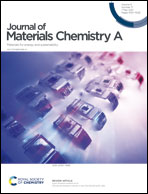Boosting the performance of lithium metal capacitors with a Li composite anode†
Abstract
Lithium metal capacitors (LMCs), inheriting the merits of lithium metal batteries with a high energy density and an outstanding power capability comparable to that of supercapacitors (SCs), exhibit tremendous potential for next-generation energy storage systems. However, the application of a Li metal anode is plagued by the formation of Li dendrites, which results in uncontrollable volume expansion, potential safety hazards and even premature failure. Here, a high-performance LMC based on a dendrite-free and resource-efficient three-dimensional Li composite anode with a robust solid-electrolyte interphase (SEI) is reported. The constructed LMC with this advanced Li composite anode achieves a record-high energy density of 492 W h kg−1 (∼1.8 times higher than the state-of-the-art value for lithium-ion hybrid capacitors, LICs) and a comparable power density of 28.5 kW kg−1 to SCs, as well as a long-term cyclability of over 2500 cycles. Furthermore, the overall performance of the LMC was further evaluated by employing a Li dendrite-free flexible carbon nanotube network current collector, and the constructed LMC based on the weight of the entire device still delivered a high energy density of 115.6 W h kg−1. This work provides a very efficient strategy for boosting the performance of LMCs by constructing dendrite-free Li metal composite anodes.



 Please wait while we load your content...
Please wait while we load your content...